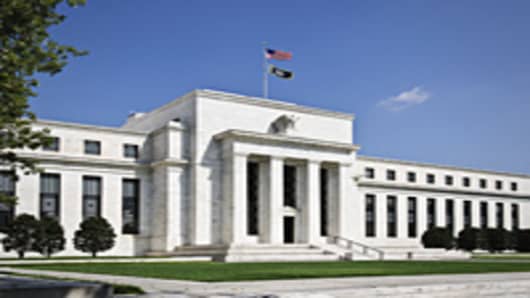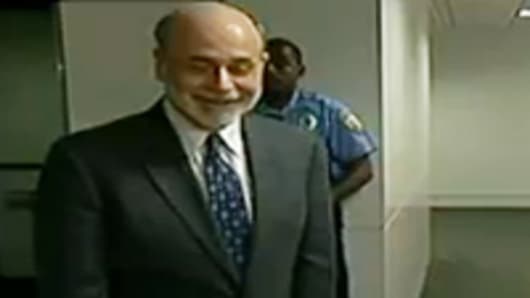Fed Chairman Ben Bernanke heads back to Capitol Hill Wednesday, but there’s little chance he’ll enlighten markets on further monetary easing or the continuation of existing programs.
Bernanke will be joined by Treasury Secretary Timothy Geithner, and both are expected to tell the House Committee on Oversight and Government Reform that European leaders are taking the right steps to address their sovereign debt crisis, but risks remain. One of the risks to be mentioned by Bernanke is the high exposure of U.S. money market funds to Europe.
In the testimony, released Tuesday evening, Bernanke said while the funds have limited their exposure to peripheral European countries, they still have high exposure to the core countries, like Germany and France. European holdings represented about 35 percent of the assets of prime U.S. money market funds in February, and the funds remain “structurally vulnerable,” he said.
Bernanke also said the reduced financial stresses in Europe are a welcome development, and that the Fed will continue to monitor the situation, working with financial institutions and foreign officials, and will “be ready to use our tools to help stabilize U.S. markets should the situation require such action.”
QE3?
Since the Fed’s meeting last Tuesday, financial markets have been adjusting to an improving economy, seeming stability in Europe and the reduced expectations for further Fed easing. Interest rates have risen in a dramatic fashion, with the 10-year reaching 2.374, a level last seen in October.
The Fed’s post-meeting statement included a slight upgrade of the economy, but it did not have any new language to suggest the Fed would do more easing.
Ward McCarthy, chief financial economist at Jefferies, said some in the market had believed QE3 could have been announced by the Fed last week. “I’m a QE3 guy. But I never thought it was going to happen before the second quarter because they’ll probably want to implement it at a time when it can dovetail with operation twist…but there were clearly some people loading up the boat,” he said.
The Fed’s ‘operation twist’ is a program under which it buys securities at the longer end of the curve and sells the short end, in an effort to influence interest rates. The program expires in June.
“The April meeting is going to be a pivotal meeting and my guess is he’s not going to tip his hand one way or another ahead of it,” said Stephen Stanley, chief economist with Pierpont Securities.
Stanley does not expect the Fed to do another round of asset purchases, or QE, because the economic data is not weak enough. At the April meeting, Fed officials will provide new forecasts for the economy and Fed funds rates expectations.
“If they don’t say anything in April, most people will assume they’re just going to let (twist) wind down,” said Stanley.
Stanley said the promise of easing and operation twist has held rates down since last August, and the economy can deal with higher rates. “I think it’s good in the sense that we’re getting closer to a more normal situation,” he said. “I think markets were distorted before. They are still distorted to some point, but not to that extent.”
“We spent over half the last year with 10-year yields at or above 3 percent,” he said, before Fed officials started talking about more easing.
Bernanke, a former professor, lectured Tuesday before a class at George Washington University on the central bank’s role and the economy. “Today he said something significant. He said you can’t tighten too soon,” said McCarthy. Bernanke, he said, wants to avoid another 1937, when the economy tipped back into recession after the Depression.
The Fed chairman also spoke to CNBC’s Steve Liesman after class Tuesday, stressing the economy is still challengedbut not revealing anything new on easing. “I think the longer term prospects for the country are very good and ultimately things will normalize. In the short run, of course we’re still dealing with some important challenges,” Bernanke said.
Liesman asked him about the recent rise in interest rates, and noted that some a CNBC survey shows that some in the markets do not believe the Fed’s forecast that it will keep rates low through 2014. “We’re going to continue to analyze the financial data we get,” he said. “The committee’s going to look at everything that’s happened. Of course, it’s an interesting period right now. We’ve seen some improvement, but we’ve still got a long way to go. So we’re going to keep looking at it.”
In his Wednesday testimony, Bernanke points to the recent stress testing of U.S. financial institutions as a measure designed to reveal the vulnerabilities of financial institutions exposed directly and indirectly to Europe, if there should be a severe crisis.
“The results show that a significant majority of the largest U.S. banks would continue to meet supervisory expectations for capital adequacy despite large projected losses in an extremely adverse hypothetical scenario,” he said.
Bernanke also mentions the swap facilities the Fed and other foreign central banks put in place to help calm the dollar funding markets and support the flow of credit. He said the use of swap lines peaked at $109 billion in mid-February, but has since fallen back to $65 billion.
What Else to Watch
Stocks sold off Tuesday on worries about a hard landing for the Chinese economy and that could stay a focus Wednesday. Analysts have been looking at China as one of several catalysts that could slow the stock market’s run, now that the S&P 500 is up more than 30 percent since October.
The Dow fell 68 points Tuesday to 13,170, and the S&P 500 fell 4 to 1405. 10-year yields fell slightly, and oil tumbled on the China concerns and also comments from Saudi Arabia that it is increasing oil production. The latest concern about China’s growth was sparked by a comment from an executive of BHP Billiton who warned that China’s demand for iron ore would flatten as growth slows.
China worries continued to hit Asian and Australian markets early Wednesday, and the U.S. dollar strengthened.
Besides Bernanke and Geithner at the 9:30 a.m. hearing, traders will be watching existing home sales data at 10 a.m.
Earnings are expected from General Mills before the bell, and Discover Financial after the close.
Oracle should also be a positive factor for tech, after its stock rose on stronger-than-expected earningslate Tuesday.
Energy will continue to be a focus of the political debate, as President Obama embarks on a four-state energy tour.
Follow Patti Domm on Twitter: @pattidomm
Questions? Comments? Email us at marketinsider@cnbc.com




